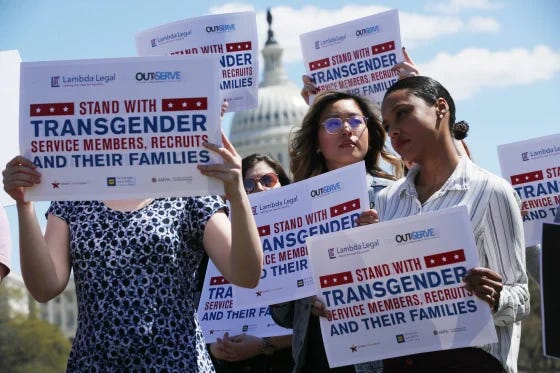Trump Set to Sign Executive Orders Barring Transgender Individuals from Military Service and Cracking Down on DEI Initiatives
New Measures Reinstate Controversial Restrictions on Transgender Service Members and Dismantle Diversity Programs
Former President Donald Trump is expected to sign executive orders on Monday that will reinstate a ban on transgender individuals from enlisting in the military, while also imposing restrictions on diversity, equity, and inclusion (DEI) initiatives within the Department of Defense (DoD).
The executive orders will undo policies from President Joe Biden’s administration, including the order that allowed transgender people to serve openly and receive transition-related healthcare. Trump’s new directive will reintroduce a policy from his first term that prohibited both the enlistment of transgender individuals and the ability for those already in the military to transition.
The executive order, outlined in a White House document, states that it will update Department of Defense medical standards to prioritize "readiness and lethality," while also banning the use of "invented and identification-based pronouns" in military settings. The order will restrict transgender individuals from using women’s facilities, such as sleeping, changing, or bathing areas, and will discontinue coverage for transition-related medical care under the military’s health program, Tricare.
While the policy will not immediately eject transgender service members, it’s unclear how the changes will impact those already receiving transition-related care, especially in light of a recent defense bill signed by Biden in December, which already prohibited coverage for gender-affirming care for transgender children of service members.
This new order marks a return to the Trump administration’s 2017 military restrictions on transgender service members, which divided personnel into two categories: exempt and non-exempt. Exempt service members, who had already transitioned before the policy took effect, could continue serving and receive transition-related medical care. Non-exempt service members were required to serve as their assigned sex at birth and were prohibited from receiving transition-related care.
The White House document also contends that the military’s readiness is compromised when transgender individuals require ongoing medical care, citing transition surgeries and treatments that may require prolonged recovery periods. Additionally, it argues that taxpayer dollars should not fund transition-related surgeries.
The order could affect an estimated number of transgender service members who serve in the military, although the exact figures are unclear. A 2014 report suggested that around 15,500 transgender individuals were in military service, while a 2016 report estimated the number to be between 2,150 and 10,790.
Emily Shilling, a transgender Navy commander and president of SPARTA, an advocacy group for transgender military service members, responded to the potential ban, expressing her desire to continue her service. Shilling, who transitioned while serving in the Navy, emphasized that she and others in the transgender community simply want to serve and use their skills in the military. She highlighted her career accomplishments, including her promotion as the top officer in her community, despite facing restrictions under Trump’s earlier policies.
In addition to the transgender service ban, Trump is expected to sign another order that will eliminate DEI programs within the military, disband any DEI offices, and require reviews of service academy curricula to remove "radical" ideologies. Secretary of Defense Pete Hegseth, a supporter of the initiative, announced on social media that "no more DEI at @DeptofDefense" and warned that non-compliance would lead to job dismissals.
These measures reflect Trump’s ongoing efforts to reshape federal policies on gender and diversity, following similar moves during his first term. His administration’s focus on restricting transgender rights and dismantling DEI programs has been a key priority, further evidenced by the recent suspension of gender marker changes for U.S. passports.


